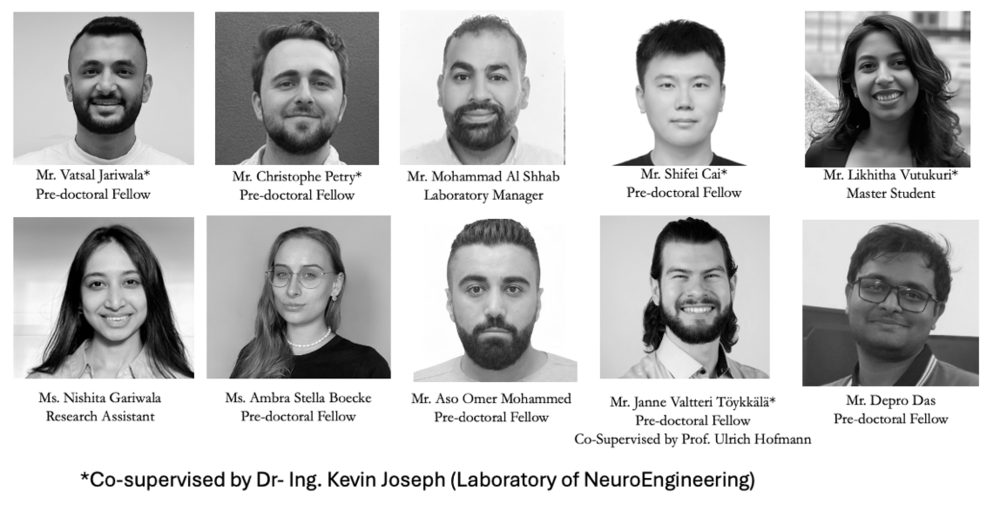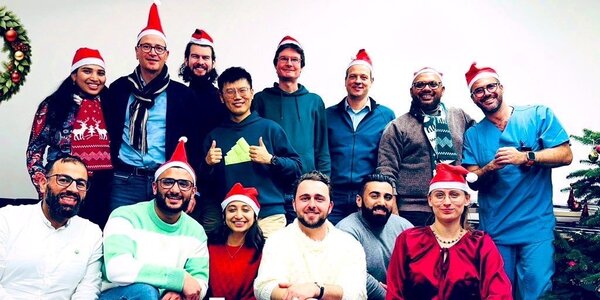3D-Brain Models Lab:

Unlocking the Secrets of Neurodegenerative Diseases & Beyond
Principal Investigator: Dr. Vidhya M. Ravi
Former Internal FRIAS Junior Fellow (Oct 2021- July 2022)
Dr. Vidhya Madapusi Ravi — Freiburg Institute for Advanced Studies – FRIAS (uni-freiburg.de)
Chief Organizer of Neuron-Glia Interface Meeting Freiburg:
The Neuron-Glia Interface | Universitätsklinikum Freiburg (uniklinik-freiburg.de)
Welcome to the 3D-Brain Models Lab
At the forefront of neuroscience innovation, our lab harnesses advanced 3D culturing techniques to cultivate long-lasting ex vivo human brain slice cultures. This breakthrough approach preserves tissue vitality, offering unprecedented insights into neurodegenerative diseases and esp brain cancers.
Our Research Focus
We combine state-of-the-art methods—including single nuclei sequencing, spatial transcriptomics, and multi-dimensional imaging—to push the boundaries of traditional neuroscience and neuro-oncology. Our work is dedicated to uncovering the fundamental causes of neurological disorders and driving the development of pioneering diagnostic tools and treatments.
Join Our Team
We are seeking ambitious researchers passionate about transforming brain research. Join our dynamic, multicultural team and contribute to groundbreaking strategies that could redefine patient care and prevention in neurodegenerative diseases and brain cancers.
Contact Us
For further information or to apply, please email: Vidhya.ravi@uniklinik-freiburg.de
Team Members

Selected Ongoing Research:
1. CRYopreservation Of HumaN BrainS (CRYON’s)
Nature has shown us that tolerance to freezing ensures reptilian survival, and there has been several advancements in the nascent field of “cryobiology” where researchers have tried to cryopreserve Oocytes, Ovarian tissue, Spermatozoa and Arteries. However, achieving this in a complex organ such as brain is still a challenge. Each freeze-thaw process during the cryopreservation process causes significant damage. Although providers who offer cryopreservation of the whole human brain exist, there is almost no characterization regarding the detrimental effects of cryopreservation, with debates regarding long term epigenetic reprogramming of the preserved brain. In this context, we aim to comprehensively study the effects of cryopreservation on the human brain at several time scales using next generation techniques.
2. AutograFt Immune CompeteNt HumAn GLioblastoma ModEl (FINALE)
Glioblastoma (GBM) stands as the most aggressive form of brain tumor, with a median patient survival time of less than 14 months. The tumor microenvironment (TME) within GBM plays a crucial role in driving tumor proliferation and drug resistance, making it a promising therapeutic target. However, progress in developing TME-targeting treatments has been hindered by the lack of a reliable preclinical model that accurately mirrors the unique features of the human brain.Addressing this challenge, we have established a human cortical tissue-based GBM model that closely replicates the composition and function of the human brain. Our research team's long-term goal is to unravel the molecular intricacies of GBM's distinctive physiology and leverage this knowledge to develop novel therapeutic strategies.Our central hypothesis, based on previously published data, suggests that unwanted immune responses and interactions within the TME in existing patient-mismatched models contribute to tumor growth and interactions. To overcome this limitation, our proposed project "FINALE" aims to create personalized GBM models that can comprehensively and accurately address these challenges. By harnessing an innovative combination of tissue engineering and transcriptomic characterization using state-of-the-art techniques, we strive to engineer human brain models that can precisely dissect the mechanisms of GBM progression, accelerate clinical testing, and most importantly, provide a platform for personalized medicine.
3. Exploring Reactive Astrocytes transformation in IDH-mutant Gliomas:
Astrocytes play a crucial role in the tumor microenvironment, and their reactive transformation in IDH wild-type glioma has been shown to contribute to anti-tumor immunity and support pro-oncogenic signaling. However, the role of intra- and peritumoral astrocytes in IDH1/2 mutated glioma, a prognostically beneficial subgroup with oncogene-driven enrichment of R-2-hydroxyglutarate (2-HG), remains largely unexplored. In this project, we set out to characterize the transcriptomic signature of IDH1/2-mutant glioma-associated astrocytes and unveil a unique inflammatory transformation that differs significantly from astrocytes in IDH wild-type glioma patients.
4. mRNA-based multi-functional CAR-immune cells for glioma treatment (in collaboration with University Hospital Zurich: Dr. Tobias Weiss)
This project seeks to develop an innovative approach by engineering peripheral blood mononuclear cells (PBMCs)—a heterogeneous immune cell population that includes T cells, natural killer (NK) cells, and monocytes—to recognize and eliminate cancer cells. This mixed immune population offers unique advantages in targeting GBM, leveraging both adaptive and innate immune mechanisms. T cells provide antigen-specific cytotoxicity, NK cells deliver immediate anti-tumor responses without prior antigen sensitization, and monocytes contribute to sustained immune activation and modulation within the TME. Together, these immune components enable a broader and more comprehensive anti-tumor response compared to CAR-T cells alone. In this study, immune cocktails were evaluated using human ex vivo brain slice cultures and a human glioblastoma (GBM) model.

Success Stories Over the years:
EANO Youngster Award 2022: Dr. Vidhya M. Ravi

(Congratulations to Mr. Junyi Zhang for being awarded the "Best Poster Presentation" prize at the NGI 2022 conference in Freiburg)
2024: State funding from Baden Württemberg

Group Photos
Christmas 2024
Videos:
Tumor growing along the blood vessel in Human Neo-cortical Tissue:
Alumini:
- Mr. Junyi Zhang (Guest Student)
- Dr. Giuseppina Catanzaro (Guest Researcher from Italy)
- Mr. Laurin Ganser ( Bachelor Thesis Student)
- Mr. Mathieu Larroquette (Visiting PhD student)
- Mr. Tao Peng (Guest Student)
- Ms. Youran Kong (Guest Student)
Klinik für Neurochirurgie
im Neurozentrum
Breisacher Straße 64
D-79106 Freiburg
Telefon: 0761 270-50010 /-50020
Telefax: 0761 270-50240
neurochirurgie@uniklinik-freiburg.de
Prof. Dr. Jürgen Beck
Ärztlicher Direktor
Telefon: 0761 270-50060
International call: +49-761-270-50060
j.beck@uniklinik-freiburg.de

André Doherr
Pflegedienstleiter
Telefon 0761 270-52260
Telefax 0761 270-54200
andre.doherr@uniklinik-freiburg.de

Christian Böke
Kaufmännische Geschäftsführung Neurozentrum
Telefon: +49 761 270-21071
christian.boeke@uniklinik-freiburg.de





